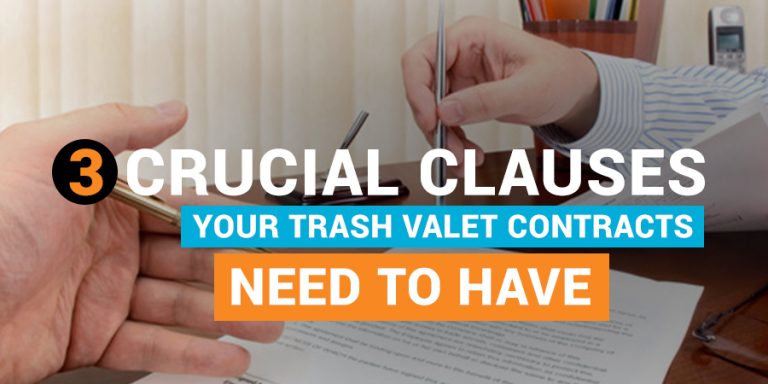Business agreements need written contracts. They are the vehicle by which the two parties have pre-agreed to operate under. Written contracts offer individuals and businesses with a legal document stating the expectations of both parties and how adverse situations will be determined. A contract reduces the chance of a lawsuit since scenarios are already defined on what may happen under varying circumstances. Contracts are a good thing! They are meant to protect both you and your customer.
There are three crucial clauses to consider when you and your lawyer draw up your trash valet contracts.
#1 Valet Trash Service Fee
Perhaps the number one clause is your fee. In the legal terms, a fee is called ‘consideration.’ Without consideration, there is no binding contract. It has to be at least $1. And, of course, as the owner/entrepreneur, you want to be perfectly clear on how much and when you expect to be paid. The interest charged for invoices being paid late are also included in this clause.
To keep your contracts as simple and cookie-cutter as possible, it is often suggested that a separate Schedule B be used for the pricing structure. The Schedule B is mentioned in the contract which continues to substantiate that it is a binding agreement and part of the main contract. The Schedule B will also contain the number of pick-up nights, the actual nights of service, the contractual term or length of the service, and the number of units, also known as doors.
#2 Valet Trash Termination
The termination clause is designed to specifically lay out the steps to be taken, by both parties, when the term (length) of the contract has been reached, and not being renewed. The termination clause is important to the valet waste service provider because there are considerations regarding the trash containers and how to handle them.
#3 Valet Trash Service Guidelines
This clause is essential in outlining the nature of the service provided.
This clause should include:
- The nature of the services
- Acceptable waste and recycling materials
- Holidays when service will not be provided
An additional provision that is critical for all door-to-door trash collection program contracts is the limitations of liability clause. This clause limits the damages that can be recovered to a certain dollar amount. The amount can be set arbitrarily, however. Depending on the subject matter of the contract, courts frequently enforce a requirement that the amount be reasonable otherwise the clause will be held to be unenforceable. Although the significance of this clause needs no explanation, it is surprising to see how many people overlook this clause and are surprised to learn of its presence when it is already too late.
*The above article does not constitute legal advice. All information in the above article is intended for educational purposes only.



